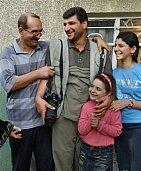AP Photographer Being Held By US
Bilal Hussein joking around with his family in Baghdad
Bilal Hussein, an AP photographer and Iraqi citizen, has been in a US military prison since April. No official charges have been filed against him, nor has a hearing been held. Hussein was captured with two insurgents who were alleged members of al-Qaida.Hussein started working for the AP in September 2004. He photographed events in Ramadi and Fallujah until his detainment began back in April.He is one of 13,000 people in Iraq being held without trial by the US.The AP is calling for Hussein's release, saying the US military has not revealed any evidence against Hussein. The military says Hussein had relationships with insurgents, but has not charged him with any crime.Is this acceptable? Should the US give Hussein the same rights afforded to US citizens?Some information on the Fourth Geneva Convention, which lays the ground rules for the treatment of civilians who are in enemy hands during wartime:An unlawful combatant (also unlawful enemy combatant or unprivileged combatant/belligerent) is a person who is accorded neither the rights a soldier would normally have under the laws of war, nor the civil rights a common criminal would normally have.[citation needed]The phrase "unlawful combatant" does not appear in the Third Geneva Convention (GCIII). However, Article 4 of GCIII does describe categories of persons who are entitled to prisoner of war status. "Prisoner of war" is generally synonymous with "detained lawful combatant."Since the September 11, 2001 attacks, the Bush administration in particular has suggested that those who do not meet this definition should be determined to be "unlawful combatant." It is opined that by this definition legal protection under the Geneva Conventions is not warranted. Nathaniel Berman in the Columbia Journal of Transnational Law observes that by declaring that some detainees do not merit the protections of criminal law, because of their combatant activities, and that they do not merit the protections of jus in bello due to the unlawful nature of their combat, the use of the term in current legal discourse seems "designed to put detainees beyond the reach of any law."[1]Should there be doubt about whether persons have fulfilled the conditions that confer prisoner of war status, Article 5 of the GCIII states that their status may be determined by a "competent tribunal" and until such time they are to be treated as prisoners of war.[2] After such "competent tribunals" have determined their status, the "Detaining Power" may choose to accord detained unlawful combatants the rights of prisoners of war as described in the Third Geneva Convention, but is not required to do so. Unlawful combatants do retain rights under the Fourth Geneva Convention so that they must be "treated with humanity and, in case of trial, shall not be deprived of the rights of fair and regular trial".[3] This latter Convention also applies to civilian non-combatants who are affected by the conflict and due special protections as "protected persons."[4](from Wikipedia)One of Hussein's photos was part of a group that won the Pulitzer Prize for Breaking News Photography last year.
Posted by courtney Sunday, September 17, 2006
Posted by courtney Sunday, September 17, 2006











0 comentarios:
Post a Comment